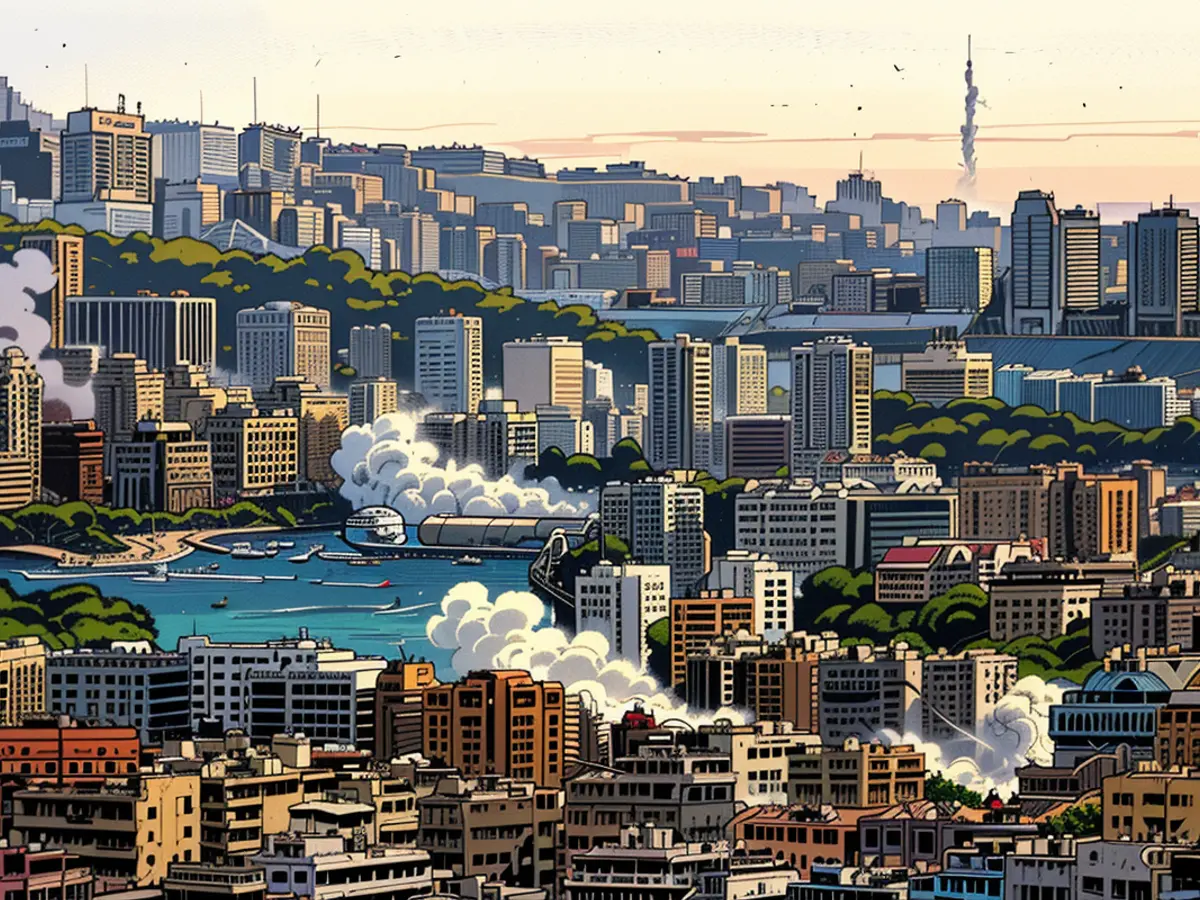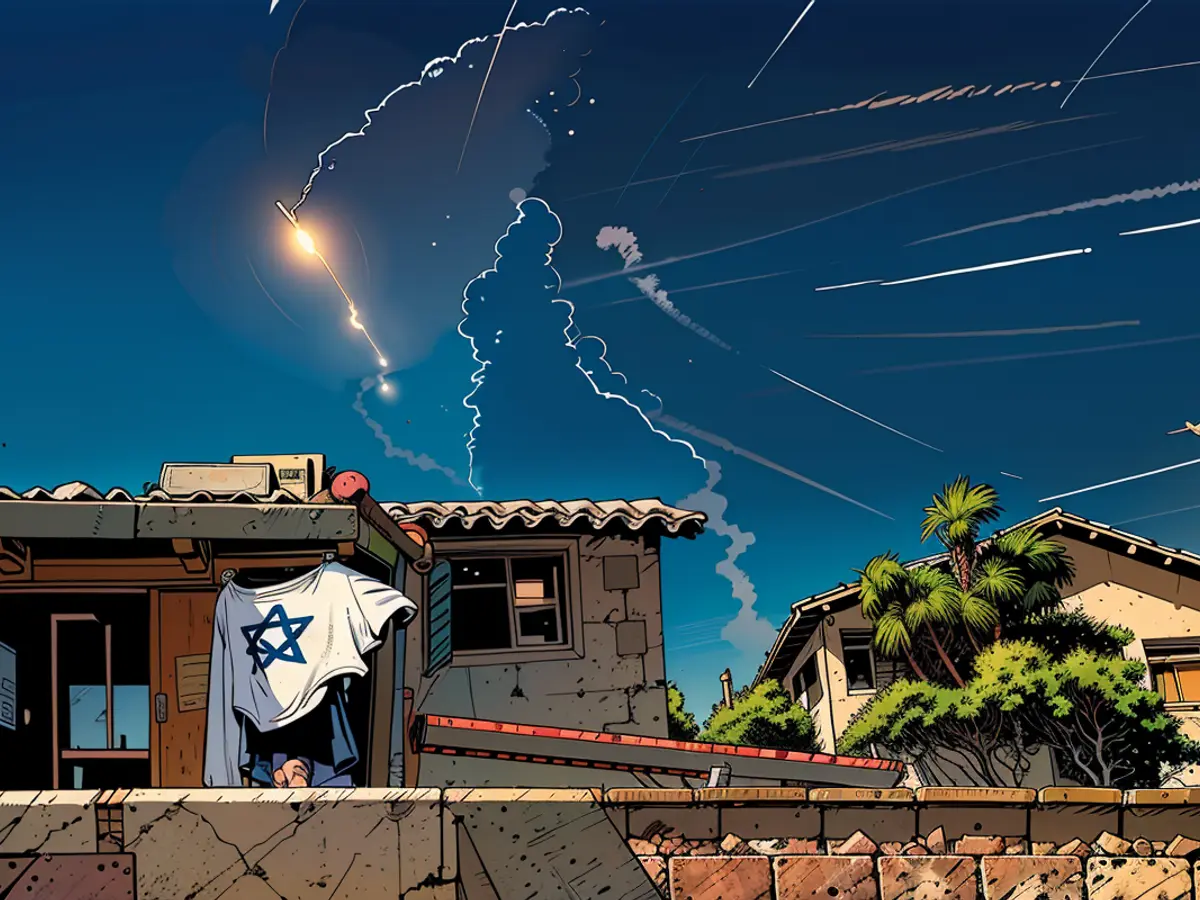Following Hezbollah's leader Nasrallah's demise and Israel considering a ground invasion in Lebanon, what potential developments could transpire?
Nasrallah's demise, in a series of intense Israeli air strikes on his underground hideout in Beirut on Friday, signifies a significant intensification in the strife between Israel and the Lebanon-based militant group, who have been assaulting Israel since the commencement of its war against Hamas in Gaza.
This incident is part of a series of critical hits Israel has dealt to Hezbollah, whose leaders and commanders have been dwindling, and the group was already struggling post the detonations of their personal communication devices – pagers and walkie-talkies, which took many lives and injured thousands earlier this month.
Israel has declared the advent of a "new phase" of conflict, with its "center of gravity" shifting northwards, referring to the Lebanon border. One of its declared war objectives is the return of tens of thousands of its displaced citizens due to cross-border skirmishes.
As a result of the escalation, hundreds of thousands of people within Lebanon have been displaced, whereas over a thousand have lost their lives since the attacks intensified last week, according to Lebanese government authorities.
Israel has hinted at a potential ground invasion into Lebanon, which, if initiated, would mark the fourth Israeli incursion into Lebanon within the last fifty years.
Hezbollah has vowed to "continue its fight against the adversary," while Iran, an associate of Hezbollah in its network of regional proxies, has given an assurance of its support.
Here's what we know so far and where things could head.
Escalating conflict
Israel has attacked what it claims are Hezbollah strongholds in Beirut and other parts of the country on Friday and Saturday, including the bombardment of Beirut's southern suburbs, which claimed Nasrallah's life.
Some of these strikes have occurred in densely populated areas, leveling residential structures. Israel has asserted that Hezbollah stores weapons in civilian facilities, a claim the group denies, and accuses Hezbollah of using civilians as "human shields."
Lebanese civilians claim they cannot follow Israel's military instructions to abandon areas where Hezbollah is active, as the group is highly secretive, and the warnings often come seconds prior to a building's destruction.
Residents of Beirut's southern suburbs have fled to escape Israeli bombardment, with numerous people spotted sleeping in public places due to lack of space in temporary shelters.

The recent attacks transpired after Israeli Prime Minister Benjamin Netanyahu dismissed a ceasefire proposal proposed by the United States and France that advocated a 21-day truce in the Israel-Lebanon border.
The White House has revealed it had no involvement in or knowledge of Israel's Friday attack on Beirut, with US President Joe Biden characterizing Nasrallah's death as a "measure of justice for his numerous victims," including Americans, while urging de-escalation in conflicts across the Middle East.
The US perceives the possibility of a limited ground invasion into Lebanon as Israel mobilizes its forces to its northern border, according to CNN, citing high-ranking administration officials. However, the officials underscored that Israel has yet to make a decision regarding a ground invasion.
On Saturday, Israel Defense Forces spokesman Peter Lerner stated that the military was preparing for the possibility of a ground invasion, but it was only one of several alternatives under consideration.
What will Hezbollah – or Iran – do?
Following Nasrallah's death and the detonations of the group's communication devices, Hezbollah's surviving leaders are likely to be evaluating how to reorganize, communicate, and react.
Factors influencing Hezbollah's response, such as the magnitude of Israeli strikes on the group's munitions, remain uncertain. Nonetheless, experts argue that the group will not be completely incapacitated by these setbacks.
As stated by Hanin Ghaddar, a senior fellow at the Washington Institute and author of "Hezbollahland," "Hezbollah has suffered the most significant blow to its military infrastructure since its inception."
However, the group still boasts skilled commanders and maintains many of its most powerful resources – including precision-guided missiles and long-range missiles that could inflict significant damage to Israel's military and civilian infrastructure, according to Ghaddar.
To date, there has not been a significant barrage of missiles from Hezbollah that has caused substantial damage to Israeli targets. In the wake of Nasrallah's death, the group has yet to launch a major retaliation that might overwhelm Israel's Iron Dome air defense system and impact its power grid.
But the recent developments increase the likelihood of a shift.

Hezbollah will likely respond, according to Jonathan Panikoff, a former senior intelligence official specializing in the region, who told CNN: "The response is likely to be significant enough that the odds it will prompt a full-scale war will skyrocket."
Another critical concern is the extent to which Iran will intervene.
The nation has appeared hesitant to engage in direct conflict with Israel, even as their clandestine war has ventured into the open more recently – and observers suggest direct Iranian retaliation could draw the US further into the conflict.
A senior US official stated that the US believes Iran will intervene in the conflict if they perceive that they are on the verge of "losing" Hezbollah. The combined impact of Israel's operations against Hezbollah had already claimed hundreds of fighters off the battlefield, according to that official and another intelligence source.
Iran's embassy in Lebanon published a social media post on Friday, characterizing Nasrallah's death as a "serious escalation that changes the rules of the game," and warning that the perpetrator "will be punished and disciplined appropriately."
The Iranian ambassador to the United Nations requested an "emergency meeting of the Security Council" on Saturday to "condemn Israel's actions in the strongest possible terms."
However, the margins for diplomacy seem limited, especially with little noticeable advancement in a ceasefire deal for the war in Gaza after months of negotiations.
Referencing the continuous clashes between Israel and Hamas, Israel and Hezbollah, and Israel and Iran, ex-US State Department Middle East peace mediator Aaron David Miller talked to CNN: "These endless conflicts won't be wrapping up any time soon... there aren't any inspiring, diplomatic movie endings in sight."
"If we're optimistic, it's about dissuasion, management, and possibly, if Hezbollah, the Israelis, and the Iranians are game for it... negotiations that will restrain chaos," he stated.
This report contains contributions from CNN's Abbas Al Lawati, Mostafa Salem, Irene Nasser, Alex Stambaugh, and Dana Karni.
The Middle East is keeping a close eye on the developments between Israel and Hezbollah, as the world watches the potential escalation in the tensions between the two parties.
Despite the significant losses Hezbollah has suffered, including the demise of Nasrallah and the destruction of their communication devices, experts believe that the group, with its powerful resources and skilled commanders, will not be completely incapacitated by these setbacks.
(Middle East, world)








